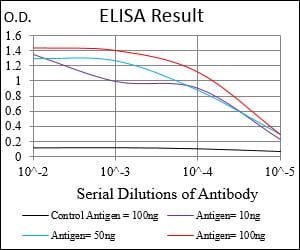
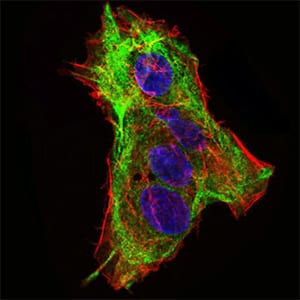
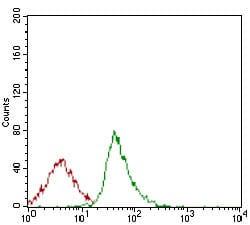
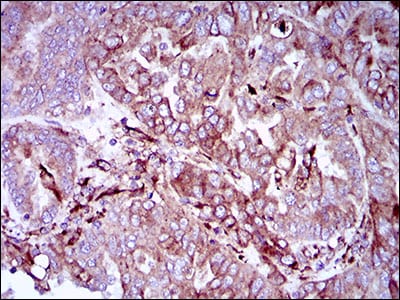
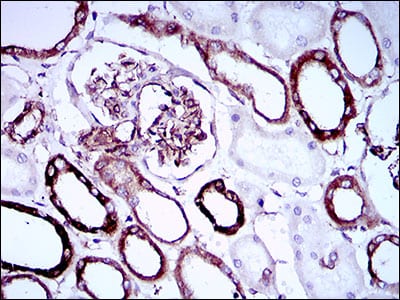
| WB | 咨询技术 | Human,Mouse,Rat |
| IF | 咨询技术 | Human,Mouse,Rat |
| IHC | 1/200 - 1/1000 | Human,Mouse,Rat |
| ICC | 1/200 - 1/1000 | Human,Mouse,Rat |
| FCM | 1/200 - 1/400 | Human,Mouse,Rat |
| Elisa | 1/10000 | Human,Mouse,Rat |
| Aliases | COR1; SCP3; SPGF4 |
| Entrez GeneID | 50511 |
| clone | 6F9B6 |
| WB Predicted band size | 27.7kDa |
| Host/Isotype | Mouse IgG1 |
| Antibody Type | Primary antibody |
| Storage | Store at 4°C short term. Aliquot and store at -20°C long term. Avoid freeze/thaw cycles. |
| Species Reactivity | Human |
| Immunogen | Purified recombinant fragment of human SYCP3 (AA: 27-128) expressed in E. Coli. |
| Formulation | Purified antibody in PBS with 0.05% sodium azide |
+ +
以下是关于SYCP3抗体的3篇代表性文献,简要总结其内容:
---
1. **文献名称**:*SYCP3 is required for synaptonemal complex assembly and homologous chromosome pairing during mammalian meiosis*
**作者**:Yuan L. et al.
**摘要**:该研究利用SYCP3抗体在小鼠模型中通过免疫荧光技术,证实SYCP3是联会复合体(SC)形成的关键蛋白,其缺失导致减数分裂中同源染色体配对失败和生殖细胞凋亡,揭示了SYCP3在减数分裂早期的核心作用。
2. **文献名称**:*Mutations in SYCP3 are associated with recurrent miscarriage and male infertility*
**作者**:Miyamoto T. et al.
**摘要**:通过人类临床样本分析,结合SYCP3抗体染色,发现SYCP3基因突变与女性复发性流产及男性无精症相关。研究显示突变导致减数分裂染色体联会异常,突显SYCP3在生殖健康中的临床意义。
3. **文献名称**:*Structural basis for meiotic chromosome synapsis by SYCP3 in human cells*
**作者**:Syrjänen J.L. et al.
**摘要**:利用SYCP3抗体的免疫定位和冷冻电镜技术,解析了SYCP3蛋白在人类减数分裂中通过形成多聚体结构介导染色体联会的分子机制,为理解联会复合体组装提供了结构生物学证据。
---
以上文献均聚焦SYCP3在减数分裂中的功能及抗体应用,涵盖基础机制、疾病关联和结构解析等领域。如需扩展,可进一步检索近年关于SYCP3抗体在癌症或生殖技术中的研究。
The SYCP3 antibody targets the synaptonemal complex protein 3 (SYCP3), a key component of the synaptonemal complex (SC) essential for meiosis in germ cells. SYCP3 plays a critical role in assembling and stabilizing the SC during prophase I of meiosis, facilitating homologous chromosome pairing, recombination, and segregation. It is predominantly expressed in germ cells of the testes and ovaries, making it a vital marker for studying meiotic processes and germ cell development.
SYCP3 antibodies are widely used in reproductive biology research to visualize SC formation, assess meiotic progression, and investigate infertility-related disorders. They enable detection of SYCP3 via techniques like immunofluorescence, immunohistochemistry, and Western blotting, helping identify abnormalities in chromosome synapsis or meiotic arrest. Mutations or dysregulation of SYCP3 are linked to conditions such as azoospermia, premature ovarian insufficiency, and miscarriages, underscoring its clinical relevance.
Commercially available SYCP3 antibodies are crucial tools for both basic research and diagnostic applications, aiding in understanding gametogenesis, evaluating fertility issues, and exploring connections between meiotic defects and cancer. Their specificity and reliability make them indispensable in studies of germ cell biology and reproductive health.
×